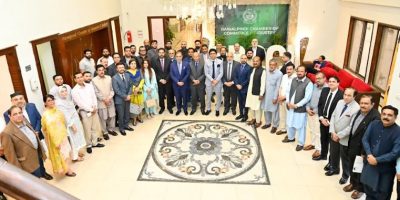BTBU-ECOSF hold joint training to build STI capacity in Pakistan

BEIJING, Dec 18 /DNA/ – The 4th Joint Training Program on science, technology and innovation policy and tools for sustainable development in Pakistan and other Belt and Road countries was held by Beijing Technological and Business University (BTBU) in collaboration with Economic Cooperation Organization – Science Foundation (ECOSF).
According to Gwadar Pro, it was aimed at engaging participants in interactive discussions and practical reflection on existing approaches, case studies and national experiences in establishing and managing STI in the context of the global and unprecedented crisis.
While delivering the opening remarks, Prof. Dr. Manzoor Hussain Soomro, President, ECOSF highlighted that STI policies have shaped the world as it is today and it is therefore vital to deliberate on the adequate framework and the strategies to develop the STI policies as powerful governing tools which can reshape and alter the course of direction towards high economic growth trajectory for the Belt and Road countries.
“China’s Belt and Road Initiative commits to foster industrial development with strong technical cooperation in many fields, including infrastructure development, digital transformation, emerging technologies, smart cities, sustainable energy and transport etc.”
Prof. Dr. Manzoor added that, “ to achieve these massive goals, it requires a robust commitment to support science engineering.”
Dr. Bi Lianliang, Associate Researcher, Institute of International Science and Technology Relations, Chinese Academy of Science and Technology for Development (CASTED) introduced the policy framework for STI in National High Tech Zones of China.
The characteristics of China’s NHZs include focusing on high-end innovative resources to nurture endogenous development momentum, forming high-tech industry layout, inhabiting rational distribution of industrial, commercial, residential, research and development areas, etc.
For establishing a science park in BRI countries, Dr. Bi suggested establishing a national specialized agency which is responsible for the development planning, business guidance, policy support and implementation of the S&T Park. She further said that, “S&T park should not only focus on the function of innovation, but also pay attention to the function of incubation and industrial development.”
Regarding the STI Policy Framework in Pakistan, Prof. Dr. Arabella Bhutto, Mehran University Institute of Science & Technology Development (MUISTD) stated that STEM education should be promoted at the selected schools to be replicated at a larger level. Appropriate policy implementation, coordination and monitoring mechanisms will also be established to ensure policy implementation across various federal ministries and provincial departments.
Dr. Li Yan, Associate Researcher, CAST, explained China’s science and technology reform on this occasion. Ms. Mozhgan Yazdianpour, Isfahan Regional Center for Technology Incubators and Science Park Development (IRIS), Iran introduced S&T Parks in Iran.
Prof. Dr. Prof. Dr. Tassaduq Hussain, Dean Faculty of Computing and IT University of Sialkot shared his views on unlocking Sialkot’s potential as an industrial cluster for accelerated economic and industrial growth in Pakistan.
Related News

Soyabean, palm oil imports grew 53.07%, 28.55% in 09 months
ISLAMABAD, APR 24 (DNA) —Edible oil imports including soyabean and palm into the country during theRead More

RCCI Think Tank Session on Economy of Pakistan and Future Challenges
DNA Rawalpindi: The Rawalpindi Chamber of Commerce and Industry has organized a Think Tank sessionRead More


Comments are Closed